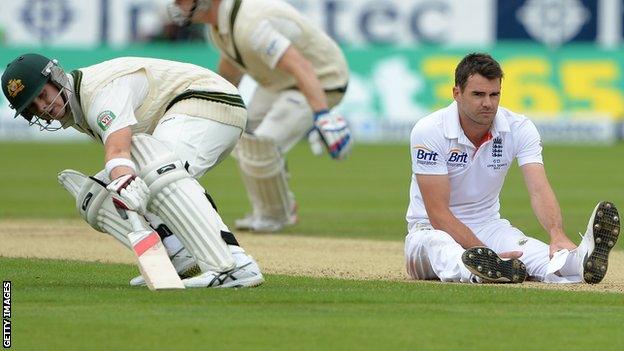Ashes 2013: James Anderson toils as Stuart Broad sets standard
- Published

James Anderson
Australia have put themselves in a strong position in the fourth Ashes Test, thanks to a hard-working hundred from Chris Rogers and a largely disappointing England bowling display.
The exception was Stuart Broad, who tore through Australia's top order in a magical new ball spell and was unlucky not to finish the day with five wickets.
But the Nottinghamshire seamer, who was rewarded for bowling a lovely full length on a consistent off stump line, received little support from his fellow bowlers as the tourists recovered from 76-4 to reach 222-5 at the close of day two.
England's biggest concern is James Anderson, who seems to have gone totally off the boil after his match-winning performance in the first Test at Trent Bridge.
He did not look right at Old Trafford, where he recorded match figures of 2-153, and he appeared equally off-colour here as he sent down 20 wicketless overs.
It is difficult to determine exactly what Anderson's problem is. Perhaps he is jaded after his exertions against New Zealand, in the Champions Trophy and the Ashes, or perhaps it is just a loss of rhythm.
Like batsmen, bowlers can fall in and out of form and nobody has a divine right to just run up and take wickets every time they play.
He is not a robot. He is a human being and all bowlers go through phases like this where things are not happening for them.
He will know deep down that his rhythm will come back but will be feeling a bit annoyed that he has not made a contribution in the last couple of Tests.
With Tim Bresnan also struggling to offer a consistent threat on a pitch not ideally suited to his strengths, England must now be regretting the decision to leave out Graham Onions.
Whereas Bresnan is a reverse swing merchant who hits the bat hard, Onions is more similar to Broad in that he bowls full, probes away around off stump and moves the ball both ways off the seam.
He knows this ground so well and I am certain he would have been a real handful on this pitch.
When the wickets dried up in the afternoon session as Rogers and Shane Watson built their 129-run partnership for the fifth wicket, it was disappointing to see England sitting back and waiting for a breakthrough.
Ashes 2013: Broad feels England need some quick wickets
Whereas Australia captain Michael Clarke was very proactive during England's innings on Friday, setting some excellent fields and making run-scoring very difficult, Cook did not do enough to frustrate Rogers and Watson.
On these pitches, where survival is hard work, the fielding team need to prevent the scoreboard from ticking over, but Rogers and Watson were able to nudge the ball into gaps and gradually ease themselves towards parity.
Rogers deserves huge credit for getting to his maiden Test century after spending 20 balls on 96 during a wonderful spell from Graeme Swann.
He was selected for his experience in scoring runs in English conditions and he drew on all that knowledge today.
He had some luck along the way, but his years in county cricket will have taught him the importance of forgetting the ball that has just gone.
If you bat in England in swinging conditions, you are going to play and miss an awful lot. If you get all jittery and worried about it then you will get out.
Ashes 2013: Chris Rogers delighted with maiden Test century
However, if you put the near misses out of your mind and focus on the next ball, then you will prosper, as Rogers proved today.
The left-hander's century has given Australia the advantage after two days of what looks certain to be a tight, low-scoring Test.
England's batting is lacking confidence and the hosts will be under immense pressure when they come out to bat in the crucial third innings of the match.
Australia will feel with some justification that they should have won the last Test, and they are getting in a very good position to win this one.
Jonathan Agnew was speaking to BBC Sport's Sam Sheringham.
- Published10 August 2013
- Published10 August 2013
- Published10 August 2013
- Published10 August 2013
- Published9 August 2013
- Published7 August 2013
- Published1 June 2012